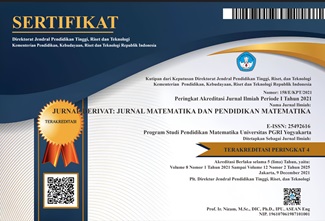Penerapan Model Pembelajaran Auditory Intellectually Repetition Terhadap Kemampuan Pemahaman Konsep Matematika Siswa Kelas X
DOI:
https://doi.org/10.31316/j.derivat.v6i2.504Abstract
Abstract
The research was a quantitative research with experimental method. The population of research were all tenth grade students of SMAN 1 Wiradesa in the 2018/2019 academic year. The research was conducted to determine the effectiveness of the application of the Auditory Intellectually Repetition (AIR) learning model to the ability to understand mathematical concepts of Grade X students of SMAN 1 Wiradesa. The results showed that the ability to understand mathematical concepts of students in classes taught using the AIR learning model achieved classical completeness, and the average value of the ability to understand mathematical concepts in the experimental class was better than the average value of the conceptual understanding ability in the control class. Based on these two results, it could be concluded that the application of the Auditory Intellectually Repetition learning model was effective on the ability to understand mathematical concepts of Grade X students of SMAN 1 Wiradesa.
Â
Keywords: AIR, the Ability to Understand Mathematical Concepts
Downloads
Published
Issue
Section
Citation Check
License
Authors who publish with this journal agree to the following terms:
-
Authors retain copyright and grant the journal right of first publication with the work simultaneously licensed under a Creative Commons Attribution-ShareAlike 4.0 International License that allows others to share the work with an acknowledgment of the work's authorship and initial publication in this journal.
- Authors are able to enter into separate, additional contractual arrangements for the non-exclusive distribution of the journal's published version of the work (e.g., post it to an institutional repository or publish it in a book), with an acknowledgment of its initial publication in this journal.
- Authors are permitted and encouraged to post their work online (e.g., in institutional repositories or on their website) prior to and during the submission process, as it can lead to productive exchanges, as well as earlier and greater citation of published work (See The Effect of Open Access).







